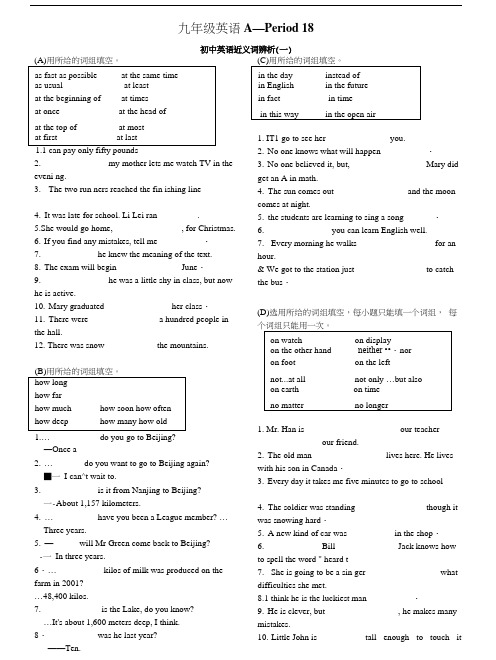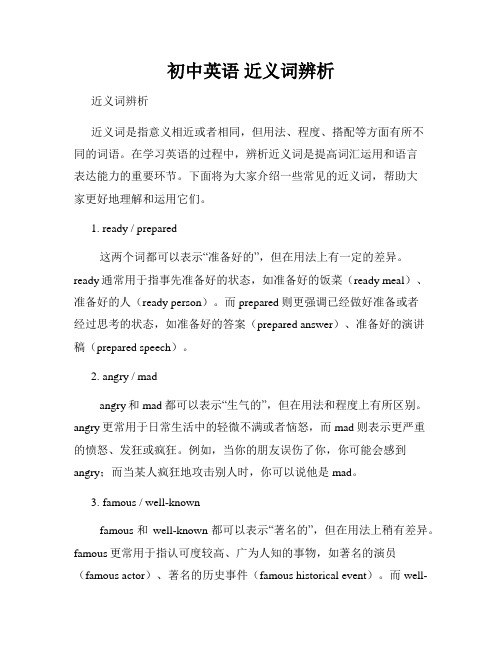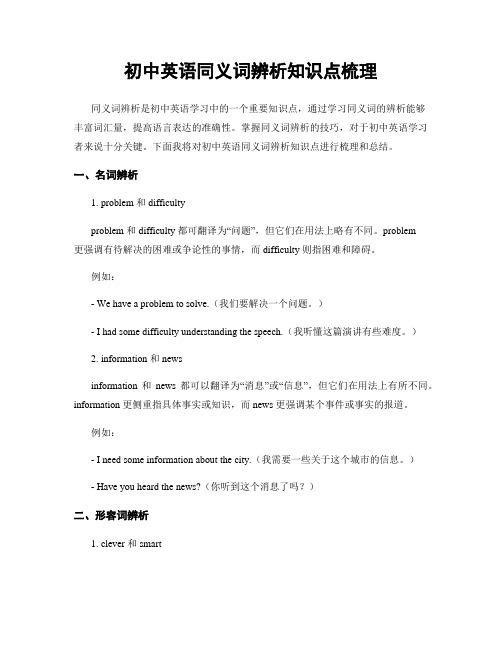初中英语近义词辨析中考复习
- 格式:doc
- 大小:44.00 KB
- 文档页数:32

九年级英语A —Period 18初中英语近义词辨析(一)2. _____________ my mother lets me watch TV in the eveni ng.3. The two run ners reached the fin ishing line4. It was late for school. Li Lei ran ________ .5.She would go home, _______________ , for Christmas.6. If you find any mistakes, tell me _________ ・7. ___________ he knew the meaning of the text.8. The exam will begin ______________ June ・9. _____________ he was a little shy in class, but now he is active.10.Mary graduated _______________ h er class ・11. There were ______________ a hundred people in the hall.12. There was snow ___________ the mountains. 2. … ______ d o you want to go to Beijing again?■一 I can^t wait to.3._________ is it from Nanjing to Beijing? 一-About 1,157 kilometers.4. … _________ have you been a League member? … Three years.5. — _____ w ill Mr Green come back to Beijing? -一 In three years.6・ … _________kilos of milk was produced on the farm in 2001? …48,400 kilos.7. __________ i s the Lake, do you know? …It's about 1,600 meters deep, I think. 8・ ___________ was he last year?——Ten.1. IT1 go to see her _____________ you.2. No one knows what will happen _________ ・3. No one believed it, but, ________________ Mary did get an A in math.4. The sun comes out _______________ and the moon comes at night.5. the students are learning to sing a song ______ ・6. ______________ you can learn English well.7. Every morning he walks ________________ for an hour.& We got to the station just _______________ to catch the bus ・ (D)选用所给的词组填空,每小题只能填一个词组, 每1. Mr. Han is ____________________ our teacher ______________ our friend.2. The old man _______________ lives here. He lives with his son in Canada ・3. Every day it takes me five minutes to go to school4. The soldier was standing _______________ though it was snowing hard ・5. A new kind of car was __________ in the shop ・6. ____________ Bill _____________ Jack knows how to spell the word " heard t7. She is going to be a sin ger ________________ w hat difficulties she met.8.1 think he is the luckiest man _________ ・9. He is clever, but ________________ , he makes many mistakes.10. Little John is _________ tall enough to touch it博雅教育培训中心 (E)选用所给的词组填空,每小题只能填一个词组,每 个咨询电话:82801866(G)选用所给的词组填空,每小题只能填一个词纟fl, 毎个词组只能用一次。

1. important = crucial(极其重要的)= significant(数量或影响大到足以重要):重要的;重大的。
2. common = universal:共同的;通用的。
3. plentiful = ample(足够且通常有额外的)= abundant:丰富的;充裕的。
4. stick = adhere = cling(紧紧抓住某物):坚持。
5. ignore = neglect(区别:ignore 意味着不关注;neglect 意味着某人对某事没有给予足够的关注):忽视;忽略。
6. near = adjacent(两个事物紧挨着)= adjoin(与adjacent 相同):邻近的。
7. pursue = seek(如果你seek 某物,你试图获得它):追求;寻求。
8. exact = precise(precise 是精确且在所有细节上准确的)= accurate:精确的。
9. vague = obscure(未知的或只有少数人知道的):模糊的;不明确的。
10. top = peak = summit:最高的;最优的。
11. competition = rival = opponent(尤其在体育和政治中):竞争;比赛。
12. blame = condemn(如果你condemn 某事,你说它非常糟糕且不可接受):责备;归咎于。
13. opinion = perspective = standpoint(意味着以特定的方式看待事件或情况):观点。
14. fame = prestige(描述那些被钦佩的人)= reputation:名声;名望。
15. build = erect(你可以erect 像建筑物之类的东西)= establish:建立;建造。
16. insult = humiliate(做某事或说某事使人们感到羞愧或愚蠢):侮辱;辱骂。
17. complain = grumble(以坏脾气抱怨某事):抱怨。

中考英语必备常考的近义词语辨析中考英语必备:常考的近义词语辨析1、表示说的say、speak、tell、told:1.Uncle Wang us a story last night.(1997重庆)A. spokeB. toldC. saidD. talked2.Can you Chinese, Mr. Smith? Yes, but just alittle.(2000海淀区)A. talkB. speakC. tellD. say2、表示看的.see、watch、talk:1.-There must be something wrong with the TV.(黑龙江)-Im afraid you may be right. I think we can it inUncle Wangs home.A. seeB. look atC. watch2.There was a strange sound outside. Mary went out and around, but she nothing.A. looked, sawB. saw, sawC. watched, lookedD. looked, find3、表示听的listen、hear:1.Now, to me carefully.said the teacher.(1997)A.look B. see C. hear D. listen2.Young People enjoy pop music.(2000泉州)A. listen toB. to listen toC. hearingD. listening to4、表示拿的bring、take、carry、hold:1.Trucks all kinds of goods here and there. (1997上海)A. carryB. takeC. bringD. hold2.-Will you show us the photos?-OK. Ill them here tomorrow.(2000宁波) A. take B. carry C. bring D. get。

初中英语近义词辨析近义词辨析近义词是指意义相近或者相同,但用法、程度、搭配等方面有所不同的词语。
在学习英语的过程中,辨析近义词是提高词汇运用和语言表达能力的重要环节。
下面将为大家介绍一些常见的近义词,帮助大家更好地理解和运用它们。
1. ready / prepared这两个词都可以表示“准备好的”,但在用法上有一定的差异。
ready通常用于指事先准备好的状态,如准备好的饭菜(ready meal)、准备好的人(ready person)。
而prepared则更强调已经做好准备或者经过思考的状态,如准备好的答案(prepared answer)、准备好的演讲稿(prepared speech)。
2. angry / madangry和mad都可以表示“生气的”,但在用法和程度上有所区别。
angry更常用于日常生活中的轻微不满或者恼怒,而mad则表示更严重的愤怒、发狂或疯狂。
例如,当你的朋友误伤了你,你可能会感到angry;而当某人疯狂地攻击别人时,你可以说他是mad。
3. famous / well-knownfamous和well-known都可以表示“著名的”,但在用法上稍有差异。
famous更常用于指认可度较高、广为人知的事物,如著名的演员(famous actor)、著名的历史事件(famous historical event)。
而well-known则更侧重于广为人知、众所周知的事物,如众所周知的事实(well-known fact)、众所周知的地方(well-known place)。
4. continue / keepcontinue和keep都可以表示“继续”,但在用法上有所区别。
continue常用于指在某种情况下继续进行某个动作,如继续学习(continue studying)、继续工作(continue working)。
而keep则表示保持某种状态或持续进行某个动作,如保持安静(keep quiet)、持续成长(keep growing)。

初中英语同义词辨析知识点梳理同义词辨析是初中英语学习中的一个重要知识点,通过学习同义词的辨析能够丰富词汇量,提高语言表达的准确性。
掌握同义词辨析的技巧,对于初中英语学习者来说十分关键。
下面我将对初中英语同义词辨析知识点进行梳理和总结。
一、名词辨析1. problem 和 difficultyproblem 和 difficulty 都可翻译为“问题”,但它们在用法上略有不同。
problem更强调有待解决的困难或争论性的事情,而 difficulty 则指困难和障碍。
例如:- We have a problem to solve.(我们要解决一个问题。
)- I had some difficulty understanding the speech.(我听懂这篇演讲有些难度。
)2. information 和 newsinformation 和news 都可以翻译为“消息”或“信息”,但它们在用法上有所不同。
information 更侧重指具体事实或知识,而 news 更强调某个事件或事实的报道。
例如:- I need some information about the city.(我需要一些关于这个城市的信息。
)- Have you heard the news?(你听到这个消息了吗?)二、形容词辨析1. clever 和 smartclever 和smart 都可以翻译为“聪明”的意思,但它们在用法和意义上有所差别。
clever 强调智力明晰,能够快速理解和解决问题,而 smart 则更侧重于外表和衣着得体。
例如:- He is a clever student who always gets good grades.(他是个聪明的学生,总是取得好成绩。
)- The boy looks smart in his new suit.(这个男孩穿上新衣服看起来很帅气。
)2. interesting 和 excitinginteresting 和 exciting 都可以翻译为“有趣”的意思,但它们在用法上有所区别。

中考英语词汇辨析常考知识点是什么关键信息项:1、词汇辨析的类型2、常考的近义词和反义词3、易混淆的动词短语4、名词的单复数形式与词义变化5、形容词和副词的比较级和最高级6、词汇在语境中的准确运用11 词汇辨析的类型111 近义词辨析在中考英语中,近义词辨析是常见的考点之一。
例如,“big”“large”和“huge”都有“大”的意思,但在使用时存在细微差别。
“big”较为常用,可指体积、程度等方面的大;“large”侧重于面积、范围的大;“huge”则强调尺寸极大,超乎寻常。
112 反义词辨析反义词的考查也不容忽视。
像“happy”(高兴的)与“sad”(悲伤的)、“fast”(快的)与“slow”(慢的)等,考生需要准确理解其含义和用法。
113 形似词辨析一些词汇在拼写和发音上相似,但词义完全不同。
如“quite”(相当)和“quiet”(安静的),“accept”(接受)和“except”(除之外)。
12 常考的近义词和反义词121 常见的近义词“look”“see”“watch”都与“看”有关,但“look”强调看的动作,“see”侧重于看的结果,“watch”则常指观看活动、比赛等。
“spend”“cost”“take”“pay”都有“花费”之意,“spend”主语是人,“cost”主语是物,“take”通常用于“it takes sb some time to do sth”句型,“pay”常与“for”搭配。
122 常见的反义词“good”与“bad”、“right”与“wrong”、“many”与“few”、“much”与“little”等反义词在中考中经常出现,需要考生清晰掌握其用法和区别。
13 易混淆的动词短语131 由“put”构成的动词短语“put on”(穿上)、“put off”(推迟)、“put up”(张贴;举起)、“put away”(收拾好)等,这些短语的含义和用法各不相同。
B7Units 1-2* good/ nice/ fine/ well(1) This film is so that many people want too see it.(2) – Hi! How are you? –, thanks. And you?(3) They sing very .(4) That’s very of you to say so.(5) Don’t worry! Our parents are very .四个词都表示“好”的意思。
good用来修饰名词或放在系动词后面作表语,尤其指事物质量好,还可指令人愉快的、好心的或有益的等。
nice表示“令人愉快的,好心的”。
well作副词时用来修饰动词或形容词,表示“(做)得好”。
作形容词时,只能表示“身体健康的”。
* this/ these/ that/ those(1) – Which book do you want to choose?–I don’t like one. I like one over there.(2) –Come and see. are your coats, aren’t they?- No, they aren’t. coats over there are mine.四个词都是指示代词,同时也能够起到形容词的作用。
this这个,that那个,修饰或代替单数名词或名词性短语;而these这些,those那些,修饰或代替复数名词或名词性短语。
this,these通常是近指(相对来说);that, those通常是远指。
* Excuse me/ Sorry (I’m Sorry)(1) , may I borrow your dictionary, please?(2) –Could you go shopping with me?-, I have a lot of housework to do.(3) , which is the way to the bus stop?(4) I’m , I broke your glasses.(5) I’m about your illness.Excuse me主要用于以下场合:a) 问路、借东西等打搅或麻烦别人时:b) 和人交谈过程中,突然要离开一会儿或做点儿别的事时;c) 表示异议,客气地纠正别人的话时;d) 打喷嚏、打嗝等给别人带来不便时。
初中英语同义词辨析复习资料
初中英语同义词辨析复习资料
Ⅰ. begin 开始,是很普通的用语,指开始某一行动或进程,与end 相对。
如:
① Its time to begin work. 是开始工作的时候了。
② She began to work in the factory at the age of fifteen.
她十五岁开始在工厂里工作。
③ The meeting will begin at eight oclock.
会议将于八点钟开始。
Ⅱ. start 开始,往往与begin通用,但它着重于开始或着手这一点,与stop 相对。
如:
① When did you start work? 你什么时候开始工作的?
② He started to study English. 他开始学英语。
③ The child started crying. 小孩哭起来了。
[注]:表示动身;启程;开动(机器)等。
如:
①I think we ought to start at 8. 我认为我们应该8点出发。
另外mence是三词中最正式的',其后接动词时只能接动词的-ing形式。
如:
②The Prime Minister menced speaking 25 minutes ago.
首相是25分钟前开始发言的。
中考英语近义词汇及词组辨析中考英语考试中,近义词汇及词组的辨析是一个很重要的考点。
同学们在备考过程中应该特别注意掌握这些词汇及词组的区别和用法。
本文将为大家介绍一些常见的近义词汇及词组,帮助同学们更好地应对中考英语。
一、accurate与correctaccurate和correct都表示“准确的”。
它们的区别在于:accurate强调准确度的高,而correct则更多地强调符合规范、正确的。
例如:1. The scientist made accurate measurements. (科学家做出了准确的测量。
)2. Please correct your mistakes in the essay. (请在作文中纠正你的错误。
)二、advice与adviseadvice是名词,意为“建议”或“忠告”,而advise是动词,意为“建议”或“提供意见”。
例如:1. Can you give me some advice on how to learn English? (你能给我一些建议如何学习英语吗?)2. I advise you not to be late for the meeting. (我建议你们不要迟到会议。
)三、borrow与lendborrow和lend都与“借”的概念有关,但使用上有所不同。
borrow表示“借入”,lend表示“借出”。
例如:1. Can I borrow your pen? (我能借用你的钢笔吗?)2. Could you lend me some money? (你能借给我一些钱吗?)四、famous与popularfamous和popular都表示“著名的”,但有所不同。
famous更多地指代某个人或事物在广泛的范围内被人所熟知,而popular则更多地指代某个人或事物在大众之间受欢迎。
例如:1. Mozart is a famous composer. (莫扎特是一个著名的作曲家。
初中英语反义词与近义词辨析25题1. “big”的近义词是(),反义词是()。
A. large; smallB. small; hugeC. huge; little 答案:A 解析:“big”意思是“大的”,近义词是“large”,反义词是“small”。
2. “tall”的近义词是(),反义词是()。
A. high; shortB. long; lowC. short; high 答案:A 解析:“tall”意思是“高的”,近义词是“high”,反义词是“short”。
3. “good”的近义词是(),反义词是()。
A. fine; badB. bad; niceC. nice; wrong 答案:A 解析:“good”意思是“好的”,近义词是“fine”,反义词是“bad”。
4. “fast”的近义词是(),反义词是()。
A. quick; slowB. slow; rapidC. rapid; lazy 答案:A 解析:“fast”意思是“快的”,近义词是“quick”,反义词是“slow”。
5. “old”的近义词是(),反义词是()。
A. ancient; youngB. young; newC. new; modern 答案:A 解析:“old”意思是“老的,旧的”,近义词是“ancient”,反义词是“young”。
6. “buy”的反义词是(),近义词是()答案:sell,purchase 解析:“buy”意思是购买,“sell”意思是出售,是反义词;“purchase”也有购买的意思,是近义词。
7. “come”的反义词是(),近义词是()答案:go,arrive 解析:“come”表示来,“go”表示去,是反义词;“arrive”有到达的意思,和“come”在某些语境中有相近的含义,是近义词。
8. “do”的反义词是(),近义词是()答案:undo,perform 解析:“do”有做的意思,“undo”表示撤销、解开,是反义词;“perform”也有执行、做的意思,是近义词。
初中英语近义词辨析中考复习1.clothes, cloth, clothingclothes统指各种衣服,谓语动词永远是复数, cloth指布,为不可数名词 clothing 服装的总称,指一件衣服用a piece of, an article of2.f amily, house, homehome 家,包括住处和家人,house房子,住宅,family家庭成员.My family is a happy one.3.s ound, voice, noisesound自然界各种各样的声音,voice人的嗓音,noise噪音I hate the loud noise outside.4.p hoto, picture, drawingphoto用照相机拍摄的照片,picture可指相片,图片,电影片,drawing画的画.5.p opulation, peoplepopulation人口,人数,people具体的人 China has a large population.6.r oad, street, path, wayroad具体的公路,马路,street街道,path小路,小径,way道路,途径take this road; in the street, show me the way to the museum.7.c ustom, habitcustom传统风俗,习俗,也可指生活习惯,后接to do, habit 生活习惯,习惯成自然,后接of doing. I've got the habit of drinking a lot.8.e xercise, exercises, practiceexercise运动,锻炼(不可数),exercises练习(可数),practice (反复做的)练习Practice makes perfect.9.c lass, lesson作"课"解时,两者可以替换.指课文用lesson. 指班级或全体学生用class. Lesson 6; class 5.10.officer, officialofficer部队的军官,official政府官员 an army officer 11.work, job二者均指工作。
work不可数,job可数 a good job12.couple, paircouple主要指人或动物,pair多指由两部分组成的东西 a pair of trousers13.country, nation, state, landcountry侧重指版图,疆域,nation指人民,国民,民族,state 侧重指政府,政体,land国土,国家 The whole nation was sad at the news.14.police, policemanpolice警察的总称,后接复数谓语动词,policeman 指某个具体的警察 The police are questioning everyone in the house.15.problem, questionproblem常和困难连系,前面的动词常为think about, solve, raise,question常和疑问连系,多和ask, answer连用. 16.chick, chicken二者均可指小鸡,chicken还可以当鸡肉The chicken is delicious.17.trip, journey, travel, voyagetravel是最常用的,trip指短期的旅途,journey指稍长的旅途,voyage指海上航行a three-day trip18.sport, gamesport多指户外的游戏或娱乐活动,如打球,游泳,打猎,赛马等;game指决定胜负的游戏,通常有一套规则 His favorite sport is swimming.19.price, prizeprice价格,prize奖,奖品,奖金 win the first prize, The price is high/low.20. a number of, the number ofa number of许多,谓语动词用复数。
the number of…的数目,谓语动词用单数。
The number of students is increasing. 21.in front of, in the front ofin front of范围外的前面,in the front of范围内的前面 In the front of the room sits a boy.22.three of us, the three of usthree of us我们(不止三个)中的三个,the three of us我们三个(就三个人)The three of us---Tom, Jack and I went to the cinema.23.by bus, on the busby bus表手段,方式,不用冠词,on the bus表范围 They went there by bus.24.next year, the next yearnext year将来时间状语,the next year过去将来时间状语 He said he would go abroad the next year.25.in place of, in the place ofin place of代替,in the place of在…地方 A new building is built in the place of the old one.26. a girl, one girla girl可泛指所有女孩, one girl一个女孩 Can one girl carrysuch a big box?27.the doctor and teacher, the doctor and the teacherthe doctor and teacher指一个人,既是医生又是老师,the doctor and the teacher两个人,一个医生和一个老师 the doctor and teacher is28.in bed, on the bedin bed卧在床上,on the bed在床上 The book is on the bed.He is ill in bed.29.in charge of, in the charge ofin charge of管理,负责照料, in the charge of由……照料 He is in charge of the matter. The matter is in the charge of her.30.in class, in the classin class在课上,in the class在班级里 He is the best student in the class.31. a second, the seconda second又一,再一,the second第…… He won the second prize.32.it, oneit同一物体,one同类不同一 I lost my pen. I have to buy a new one.33.that, thisthat指代上文所提到的,this导出下文所要说的 I was ill.That's why…34.none, nothing, no onenone强调有多少,nothing, no one强调有没有,nothing指物,no one指人--- How many…/How much…? --- None.35.anyone, any oneanyone指人,不能接of,any one指人物均可,可接of any one of you36.who, whatwho指姓名或关系,what指职业或地位 What is your dad? He isa teacher.37.what, whichwhat的选择基础是无限制的,which在一定范围内进行选择Which do you prefer, bananas or apples?38.other, anotherother后接名词复数,another后接名词单数 other students, another student39.many, much, a lot ofmany和可数名词连用,much和不可数名词连用,a lot of可数,不可数均可,但不用于否定句 I haven't many books.40.much more…than, many more…thanmuch more…than后接形容词或不可数名词,many more…than后接可数名词 many more people, much more water, much more beautiful41.no, notno=not a/any no friend=not a/any friend no water=not any water42.by oneself, for oneself, to oneself, of oneselfby oneself单独的,独自的,for oneself为自己,to oneself 供自己用的,of oneself 自行的,自动的 The door opened of itself.43.at all, after allat all根本,全然, after all到底,毕竟 After all he is a child.44.tall, hightall常指人或动物,high常指物体 He is tall.45.fast, quicklyfast侧重于指人或物体具有运动速度快的特点,quickly侧重指某事完成或发生的快 run fast, answer the question quickly 46.healthy, healthfulhealthy健康的,健壮的,healthful有益于健康的 healthful exercise47.sleeping, asleep, sleepysleeping正在睡觉,asleep睡着,熟睡,只能做表语,sleepy 困的,有睡意的a sleeping baby The baby is asleep. I'm sleepy.48.just, veryjust表强调时是副词,作状语,very表强调时是形容词,用作定语 the very man, just the man49.real, truereal真的,真实的,指的是事实上存在而不是想象的,true真的,真正的,指的是事实和实际情况相符合 real gold, a true story 50.pleasant, pleased, pleasingpleasant常用作定语,pleased, pleasing常用作表语,pleased 主语常为人,pleasing主语常为物 a pleasant trip The trip is pleasing.51.ill, sickill做表语,sick定,表均可 a sick boy52.good, wellgood形容词,well副词,但指身体状况是形容词 He is wellagain.53.quiet, silent, stillquiet安静的,可以发出小的声音,silent不发出声音,但可以动,still完全不动,完全无声响 He stand there still. 他站在那儿,一动不动,也不说话。